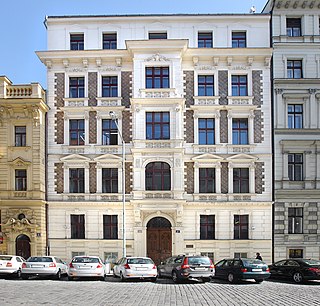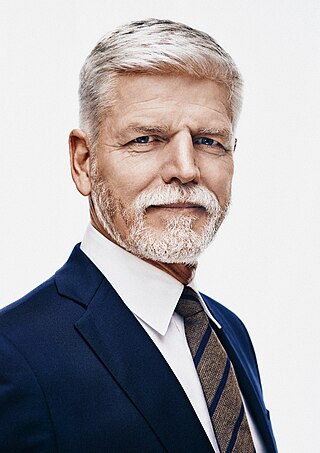
Charles University, or historically as the University of Prague, is the largest and best-ranked university in the Czech Republic. It is one of the oldest universities in the world in continuous operation, the first university north of the Alps and east of Paris. Today, the university consists of 17 faculties located in Prague, Hradec Králové, and Plzeň.

The Czechs, or the Czech people, are a West Slavic ethnic group and a nation native to the Czech Republic in Central Europe, who share a common ancestry, culture, history, and the Czech language.

Jan Žižka z Trocnova a Kalicha was a Czech general who was a contemporary and follower of Jan Hus and was a Radical Hussite and led the Taborites. Žižka was a successful military leader and is now a Czech national hero. He was nicknamed "One-eyed Žižka", having lost one and then both eyes. Jan Žižka led Hussite forces against three crusades and never lost a single battle although he was completely blind in his last stages of life.

Masaryk University (MU) is the second largest university in the Czech Republic, a member of the Compostela Group and the Utrecht Network. Founded in 1919 in Brno as the second Czech university, it now consists of ten faculties and 35,115 students. It is named after Tomáš Garrigue Masaryk, the first president of an independent Czechoslovakia as well as the leader of the movement for a second Czech university.

Czech University of Life Sciences Prague is a university of agricultural education and research in Prague, the Czech Republic, established in 1906.

The Academy of Performing Arts in Prague is a university in the centre of Prague, Czech Republic, specialising in the study of music, dance, drama, film, television and multi-media. It is the largest art school in the Czech Republic, with more than 350 educators and researchers, and 1500 students.

SK Dynamo České Budějovice is a professional football club from České Budějovice, Czech Republic. They currently play in the Czech First League, the first tier of football in the Czech Republic.

The Prague Conservatory is a public music school in Prague, Czech Republic, founded in 1808. Currently, the school offers four- or six-year courses, which can be compared to the level of a high school diploma in other countries. Graduates can continue their training by enrolling in an institution that offers undergraduate education.
Pérák, the Spring Man, was an urban legend and rumour most popular in the Czechoslovak city of Prague during the German occupation of Czechoslovakia in the midst of World War II. In the decades following the war, Pérák has also been portrayed as a Czech superhero.

František Šmahel is a Czech historian of medieval political and intellectual history, known for his works about Hussitism, universities in the Middle Ages, humanism, and Monarch representation in the Middle Ages. He is a globally-recognized expert on the Bohemian Reformation and the medieval Prague University. His scholarly activities are diverse, covering historical figures, university texts, political history, research into rituals, and the publication of source editions.

The Oriental Institute of the Czech Academy of Sciences is a research institution founded in 1922, specializing in the field of Oriental Studies. It is one of the oldest institutions dedicated to the study of Oriental cultures in Central and Eastern Europe. Since 1992, it has operated under the auspices of the Czech Academy of Sciences. The Oriental Institute collaborates with universities across Czechia for teaching and training purposes and organizes public events and lectures.

The Department of Dramatic Theatre is one of three departments at the Academy of Performing Arts in Prague. The academy was opened in 1945 immediately after the Second World War as a part of the newly created academy for the arts. The department's teachers have included prominent personalities in modern Czech theatre, such as Otomar Krejča, set designer František Tröster, Ivan Vyskočil, director Jiří Frejka, and Miroslav Haller. DAMU is a member of the European League of Institutes of the Arts (ELIA) and the European network on cultural management and policy (ENCATC).

The Faculty of Arts, Charles University, is one of the original four faculties of Charles University in Prague. When founded, it was named the Faculty of the Liberal Arts or the Artistic Faculty. The faculty provides lectures in the widest range of fields of the humanities in the Czech Republic, and is the only university faculty in Europe which provides studies in all the official languages of the European Union. The faculty has around 1,000 members of staff, over 9,000 students, and a flexible system of more than 700 possible double-subject degree combinations.

The Faculty of Social Sciences (FSS) is one of the newest faculties of Charles University. The Faculty was founded in 1990, shortly after the Velvet Revolution. It soon became a regional centre of teaching and research in area studies, economics, international relations, journalism, media studies, sociology and political science. The Faculty offers bachelor's, master's, and doctoral degree programs in social sciences. While the languages of instruction are Czech and English, students can choose from classes in a wide range of other languages, including French, German, Russian and Spanish.

Petr Pavel is a Czech politician and retired army general, currently serving as the president of the Czech Republic since March 2023. Prior to this, he held the position of Chairman of the NATO Military Committee from 2015 to 2018, and served as the Chief of the General Staff of the Czech Armed Forces between 2012 and 2015.
The Learned Society of the Czech Republic is an association of distinguished scholars of the Czech Republic from all scientific disciplines. Its goal is to support free conduct of research and furtherance of scientific knowledge. The Society was established in 1994 as a successor of The Royal Bohemian Society of Learning and the Czech Academy of Sciences and Arts.
The Compacts of Basel, also known as Basel Compacts or Compactata, was an agreement between the Council of Basel and the moderate Hussites, which was ratified by the Estates of Bohemia and Moravia in Jihlava on 5 July 1436. The agreement authorized Hussite priests to administer the sacramental wine to laymen during the Eucharist. The Council of Basel ratified the document on 15 January 1437, but it acknowledged that the communion under both kinds was not heretical only on 23 December.

Petr Sommer was a Czech historian and archaeologist. He focused on church archaeology, spiritual culture of the Middle Ages and its reflection in archaeological sources.
Events in the year 2023 in the Czech Republic.


















